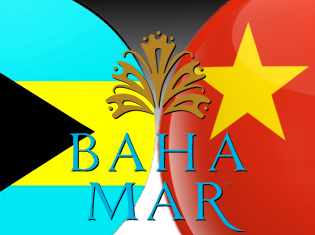 Global Gaming Asset Management (GGAM) execs are likely popping corks today following the signing of an agreement between the government of China and the Bahamas to allow mutual 30-day access to Chinese and Bahamian passport holders without the need to obtain a visa. Access to China’s vast market of gambling-mad citizens is key to the future prospects of the $3.5b Baha Mar resort casino project set to open in December 2014 on the Bahamian island of New Providence. The travel deal was undoubtedly aided by the fact that the project has been underwritten by China Exim Bank and is being built by China Construction of America, both of which are owned by the Chinese government.
Global Gaming Asset Management (GGAM) execs are likely popping corks today following the signing of an agreement between the government of China and the Bahamas to allow mutual 30-day access to Chinese and Bahamian passport holders without the need to obtain a visa. Access to China’s vast market of gambling-mad citizens is key to the future prospects of the $3.5b Baha Mar resort casino project set to open in December 2014 on the Bahamian island of New Providence. The travel deal was undoubtedly aided by the fact that the project has been underwritten by China Exim Bank and is being built by China Construction of America, both of which are owned by the Chinese government.
GGAM has been selected by Baha Mar Resorts Ltd. to run the resort’s 100k-square-foot casino space, which will feature 1,500 slot machines and 150 gaming tables. In September, the Nevada-based GGAM was let go from a similar management capacity at Bloomberry Resorts’ Solaire Casino and Resort in Manila’s Entertainment City after Bloomberry execs claimed GGAM had failed to bring in the expected number of Chinese high-rolling gamblers – a claim hotly disputed by GGAM execs. GGAM is run by former Las Vegas Sands president William Weidner, who also helms the eponymous Weidner Resorts, which is pressing hard to build a resort casino on Taiwan’s outlying Matsu Islands.
TAOYUAN GOVERNMENT SEEKS MACAU GAMING INVESTORS
Weidner’s hugely ambitious Matsu plans have stalled because Taiwanese politicians are dragging their feet on approving casino legislation. Their foot-dragging may have something to do with veiled threats from Chinese officials that – unlike, say, the Bahamas – they might not allow their citizens to travel to what China views as its renegade province purely to gamble. The uncertainty caused by these comments has prompted some Taiwanese legislators to suggest that there are too many risks surrounding the Matsu casino plan and that a casino built closer to a major urban center – like the Taoyuan Aerotropolis business zone adjacent to the Taoyuan International Airport outside Taipei – stands a far better chance of making a go of things.
Hence this week’s announcement by the Taoyuan County government that it was planning a conference to familiarize investors in Macau with the Aerotropolis project. A key intent of the conference, which is being co-produced by the Taipei Trade Center Hong Kong, is to highlight Aerotropolis’ casino gambling possibilities. Taoyuan government advisor Li Wei Feng cautioned that legislators had yet to approve any gaming for the development, but Li told the Macau Daily Times that “we can start the planning on the non-gambling elements first.” It was Li’s understanding that “it is quite easy to transform from non-gambling to gambling.” Li noted that the government’s intent was a Singapore-style model in which gambling is but one of the entertainment options on hand. “We don’t just want to import a block of casinos, we want the whole [integrated resort] industry.”
